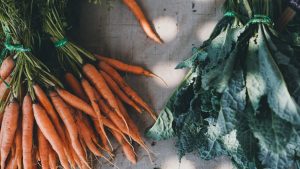 Do you cringe at the thought of the extra expense to buy organic food? There’s a lot of reasons to do it, but also ways to save money. Exactly what is organic food? It’s food that’s raised using no pesticides, synthetic fertilizer, sewage sludge, GMO organism or ionizing radiation if you’re talking about fruits and veggies for animal products, it’s ones fed organic food, allowed to graze on grass or eat a natural source of food rather than man made feed. These animals are antibiotic and hormone free.
Do you cringe at the thought of the extra expense to buy organic food? There’s a lot of reasons to do it, but also ways to save money. Exactly what is organic food? It’s food that’s raised using no pesticides, synthetic fertilizer, sewage sludge, GMO organism or ionizing radiation if you’re talking about fruits and veggies for animal products, it’s ones fed organic food, allowed to graze on grass or eat a natural source of food rather than man made feed. These animals are antibiotic and hormone free.
You’ll get more nutritional bang for your buck.
Farmers who grow organically use natural means to build the soil. That isn’t done overnight. In fact, it takes three years or more to build the soil. Unlike more traditional or modern farmers, they don’t add nitrogen, potassium or phosphorus from a bag, which limits the soil’s trace minerals. There are several studies that tested the nutritional content of organic food, compared to those grown traditionally and found that organic food has a higher nutritional content. Other studies show the nutrition of traditionally grown food has dropped over several decades, which might be as a result of limiting fertilizer to the potassium, phosphorus and nitrogen and not replenishing the trace minerals.
Insecticides, hormones and herbicides aren’t healthy for the body.
If you’re killing bugs with pesticides, why would eating traces of it on your fresh fruit make you healthier. It just doesn’t make sense to boost your health in one way and cut it down with chemicals in another. What’s even worse is that you can’t always wash off all the pesticides. If you want to save money, check the Dirty Dozen and Clean 15 list from the EWG—Environmental Working Group. The Dirty Dozen is a list of the foods that have the most pesticides even after washing. The Clean 15 are those that have the least.
What about organic meat, eggs and milk products.
So you know that organic fruit and veggies are better, what about animal products. Free range chickens and grass-fed beef have benefits, such as the conjugated linoleic acid that’s proven to be more heart healthy that’s in milk from grass-fed cows. There’s been a rise in concern that the antibiotics given cows is producing antibiotic resistant germs and also causing allergies in those who drink or eat the animal products. The extra hormones in these products are also of concern.
Organic meat, dairy and eggs have benefits, too.
Not only are you avoiding the potential for additional hormones in your system and extra antibiotics when you eat organic meat, you’re also boosting the benefits that come from the products, especially when it’s grass fed organic beef and dairy. Grass-fed beef and dairy products contain more Omega-3 fatty acids that are good for the heart, while animal products from free range chickens contain more vitamins A and E, more Omega3 fatty acid and less fat and bad cholesterol.
- You can save money by choosing organic foods from the Dirty Dozen list that contain the most pesticides and going with regular fruit and veggies when eating those from the Clean 15.
- Soaking fruits and vegetables in baking soda and water helps reduces pesticides.
- While organic fruits and vegetables may cost more now, the more they become the produce of choice, the more likely the price will drop as more people start farming that way. Take it a step further and look for organic heirloom fruits and vegetables. You’ll normally find these at farmer’s markets. These are vegetables and fruits that were produced before hybridizing for various characteristics took place. One example is the Black Krim tomato.
- For a real taste treat that has more nutrition, choose heirloom varieties that are organic. There’s nothing like the taste of an heirloom tomato that hybridizing has destroyed.
